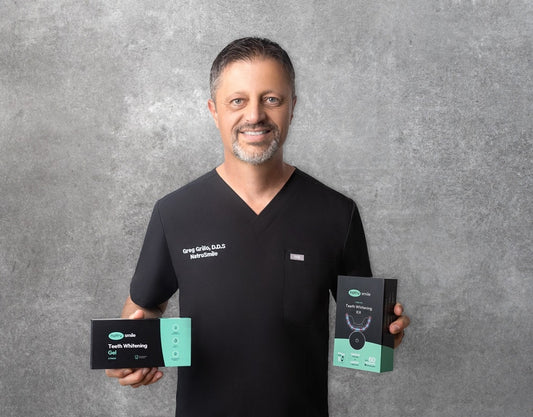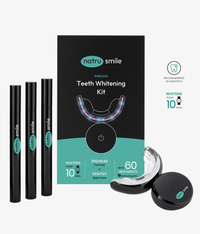For this special interview, we sat down with the esteemed Dr. Greg Grillo, D.D.S., to delve into some critical dental topics. Dr. Grillo offers his insights on the most exciting innovations in dentistry today, demystifies the meaning behind bleeding gums, and provides valuable brushing tips for those with braces.
He also unveils seven lesser-known foods, drinks, and supplements that can truly bolster your oral health (a few of which may surprise you!).

All products are certified by dental expert Dr. Greg Grillo
About Dr. Greg Grillo
Dr. Greg Grillo knows dentistry from many different angles. As a talented clinician, he built a busy multi-provider practice that served patients of all ages. He’s helped thousands of patients discover the benefits of oral health, and he enjoys highlighting the links between the mouth and the rest of the body. He’s also seen the impact that a better smile has on people’s lives, and he encourages his patients to consider how a better smile can add confidence to their interactions with others.
Dr. Grillo’s experience spans nearly three decades, and he’s built a wealth of knowledge and expertise about wellness and dentistry. He served as a dentist in the U.S. Navy, caring for Marines, pilots, sailors, and their families in South Carolina and Japan. In 1999, he entered private practice and continued investing in exceptional technology and training for his patients.
He continues to add value to his profession, working with many companies that support dentists and patients. Dr. Grillo believes people deserve trustworthy, accurate information to make decisions that support their health.
What are the most significant changes you've seen in your 28 years in dentistry?
Over the 28 years I have been practicing dentistry, I have witnessed several significant changes in the field. One of the most notable changes is the growing popularity of dental implants. Dentures and bridges were the go-to solutions for missing teeth in the past, but now dental implants are a preferred treatment option for many patients. Implants provide a permanent solution that feels and functions like natural teeth, and the technology has only improved over time.
Another significant change I have seen is the rise of aligner orthodontics, such as Invisalign. These clear, removable aligners have become a popular alternative to traditional metal braces, especially among adults who want a more discreet orthodontic treatment. Aligner technology has come a long way in recent years, and the results we can achieve with these treatments are impressive.
Lastly, there has been a growing focus on sleep health in dentistry. Dentists are becoming increasingly aware of the impact of sleep disorders, such as sleep apnea, on a patient's oral and overall health. As a result, we are now working more closely with sleep specialists to develop comprehensive treatment plans that address both dental and sleep-related issues.
Overall, it's been exciting to see how dentistry has evolved over the years, and I look forward to seeing what new advances are on the horizon.
What do you think is one of dentistry's most exciting technological advances today?
I'm constantly keeping up with the latest technological advances in dentistry, and I must say, so many exciting developments are happening right now! One of the most innovative technologies I've been working with lately is 3D printing.
With 3D printing, we can create custom dental implants, prosthetics, and even aligners right in our office. This means we can provide our patients with more accurate, precise, and efficient dental care. It also allows us to reduce the time and cost associated with traditional dental procedures, which is always a plus.
Overall, the technological advancements happening in dentistry right now are truly amazing, and I can't wait to see what the future holds!
Let’s get to basics and talk about some of the common issues you manage: Gum disease is the leading cause of tooth loss in adults, but it’s preventable, right? What is the best way to treat gum disease?
Gum disease is the most devastating oral health condition I’ve dealt with over the years. It’s not curable, but it’s almost always preventable with a proactive approach. The best way to treat gum disease is through a combination of professional dental care and good oral hygiene habits at home. In its early stages, gum disease can often be reversed with a thorough dental cleaning, followed by consistent brushing and flossing to maintain good oral health.
However, in more advanced cases, additional treatments may be necessary. For example, scaling and root planing is a standard procedure that involves removing plaque and tartar buildup from beneath the gum line and smoothing out the tooth roots to prevent further buildup.
As for new methods, there have been some exciting developments in recent years. One promising approach is laser therapy, which uses a special dental laser to remove infected tissue and promote healing. Another emerging treatment is probiotics, which involve introducing beneficial bacteria into the mouth to help restore balance to the oral microbiome and prevent the growth of harmful bacteria.
Of course, every case of gum disease is different, so the best course of treatment will depend on your specific needs and the severity of your condition.
Along those lines, isn’t it normal for gums to bleed after flossing, though?
I feel comfortable saying that bleeding gums are abnormal and indicate gum disease. Gum disease is caused by bacterial plaque buildup on your teeth and gums, which leads to inflammation, bleeding, bone destruction, and eventual tooth loss if left untreated.
Addressing bleeding gums is essential as it can also be a doorway for bacteria to enter your bloodstream and cause problems throughout the body. Bacteria in the bloodstream can travel to other organs, including the heart, lungs, liver, and kidneys, and cause infections and inflammation that can harm your overall health.
Research suggests gum disease has been linked to several health problems, such as diabetes, heart disease, stroke, respiratory diseases, and pregnancy complications. This is because the bacteria from your mouth can enter the bloodstream, leading to inflammation and causing damage to other organs.
So, taking good care of your oral health is crucial by brushing and flossing regularly, scheduling regular dental check-ups, and addressing any signs of gum disease, such as bleeding gums, as soon as possible. Remember, bleeding gums are abnormal and could indicate a more significant health issue.
What are the most common causes of tooth sensitivity, and what’s the best way to alleviate the symptoms?
There’s no question that tooth sensitivity is a common problem many patients encounter. There are several causes of tooth sensitivity, including gum recession, enamel erosion, tooth decay, teeth grinding, and tooth whitening treatments.
To alleviate the symptoms of tooth sensitivity, I often recommend my patients use desensitizing toothpaste that contains potassium nitrate. It helps to reduce sensitivity and provide relief. It is also important to avoid acidic foods and drinks, such as citrus fruits, tomatoes, and soda, which can erode the enamel and cause sensitivity.
Brushing your teeth gently with a soft-bristled toothbrush in circular motions is also helpful in preventing sensitivity. If you grind your teeth at night, wearing a mouthguard can help to protect your teeth from further damage.
If your tooth sensitivity is severe or persistent, it is essential to seek dental treatment from a dentist who can recommend appropriate treatment options. It is always better to address the issue early on, as it can lead to more severe dental problems in the future.
How can people maintain good oral hygiene while wearing braces?
Maintaining good oral hygiene while wearing braces is essential to prevent dental problems such as tooth decay and gum disease. Braces can make it difficult to clean teeth properly, but with a few adjustments to your daily oral care routine, you can keep your teeth and braces clean and healthy.
First, brush your teeth at least twice daily using a soft-bristled toothbrush and fluoride toothpaste. Brush at a 45-degree angle to the gum line and use circular motions to clean each tooth's front, back, and chewing surfaces.
Flossing is also essential; a floss threader can help get the floss between the teeth and under the wires. In addition to brushing and flossing, an interdental brush or a water flosser can help remove food particles and plaque from hard-to-reach areas. It's also essential to avoid sticky or hard foods, as they can damage your braces and make it difficult to clean your teeth.
Finally, visit your orthodontist regularly for check-ups and adjustments to ensure your braces work correctly and address any dental issues early on. By following these tips, you can maintain good oral hygiene while wearing braces and achieve a healthy, beautiful smile.
How often should someone replace their toothbrush, and what type is best?
Great question! As a dentist, I recommend replacing your toothbrush every three to four months. After that time, the bristles can become frayed and less effective at removing plaque and bacteria from your teeth and gums. Additionally, if you've been sick or have had any kind of oral infection, it's a good idea to replace your toothbrush immediately to avoid reinfecting yourself.
As for what type of toothbrush to use, I typically recommend a soft-bristled brush. It's essential to use a brush with bristles that are gentle on your teeth and gums, as using a brush with hard bristles can actually cause damage to your enamel and gum tissue. Electric toothbrushes can also be a great option, as they can be more effective at removing plaque and debris from hard-to-reach areas.
Ultimately, the most important thing is to find a toothbrush that you're comfortable using and that allows you to clean your teeth and gums effectively. If you have any questions or concerns about your oral health or dental hygiene routine, please don't hesitate to ask!
With the strong link between the mouth and general health, can you recommend any foods or supplements that can improve oral health?
Yes, several foods and supplements can improve oral health. Here are a few recommendations I’ve seen work with my patients:
- Dairy Products: Milk, cheese, and yogurt are rich in calcium, which is essential for strong teeth and bones.
- Vitamin C: Foods rich in vitamin C, such as oranges, kiwis, and strawberries, can help boost gum health by strengthening the blood vessels and reducing inflammation.
- Probiotics: Probiotic-rich foods like yogurt, kefir, and fermented vegetables help restore the natural balance of bacteria in your mouth and can help prevent bad breath and tooth decay.
- Green Tea: Green tea contains polyphenols, which can help reduce inflammation and prevent the growth of bacteria associated with gum disease.
- Vitamin D: Vitamin D helps the body absorb calcium, which is essential for strong teeth and bones. You can get vitamin D from sunlight, fatty fish, or supplements.
- Omega-3 Fatty Acids: Omega-3 fatty acids found in fatty fish like salmon and mackerel can help reduce inflammation and prevent gum disease.
- Xylitol: Xylitol is a natural sugar substitute that can help reduce the risk of tooth decay by inhibiting the growth of harmful bacteria in the mouth.
Remember, while these foods and supplements can help improve oral health, they should not replace proper dental hygiene practices such as brushing and flossing regularly and visiting the dentist for regular check-ups.
What’s one dental health trend you’re concerned about today?
One of my biggest concerns about dental health trends today is the increased consumption of sugary and acidic drinks, such as sports, energy, and soda. These drinks can be highly damaging to your teeth over time, as they can erode the enamel and cause tooth decay.
Many people don't realize just how harmful these drinks can be, especially when consumed regularly. In addition to the sugar content, which can feed harmful bacteria in your mouth, these drinks are often highly acidic, which can cause even more damage to your teeth.
My concern is that people may be drinking these types of beverages without realizing the impact that they can have on their oral health. While it's certainly OK to enjoy these drinks in moderation, it's important to be aware of the potential risks and to take steps to protect your teeth, such as drinking plenty of water and practicing good oral hygiene habits like brushing and flossing regularly.
As a dentist, I always encourage my patients to be mindful of what they eat and drink and make choices supporting their oral health. By being aware of the potential risks of sugary and acidic drinks and minimizing their consumption, we can all help protect our teeth and keep our smiles healthy for years to come.
It seems like everybody wants a better smile, and porcelain veneers are one option. What are some of the benefits of getting veneers?
Dental veneers are a popular cosmetic dentistry treatment that involves placing a thin layer of porcelain or composite resin on the front surface of teeth to improve their appearance. While veneers can help achieve a beautiful smile, there are potential risks and benefits to consider before undergoing the procedure.
One of the primary benefits of getting veneers is their ability to transform the appearance of teeth quickly and effectively. Veneers can correct various cosmetic dental issues, including discoloration, chips, cracks, gaps, and misshapen teeth. They can also improve teeth' size, shape, and symmetry, creating a more aesthetically pleasing smile.
Another benefit of veneers is their durability. When properly cared for, veneers can last 10-15 years or even longer. They resist staining and discoloration, which means they can help maintain a bright white smile for years. Veneers are also easy to care for, requiring only regular brushing, flossing, and dental check-ups to maintain appearance and functionality.
Do you think teeth whitening provides a worthwhile benefit for most healthy patients?
As a dentist, I’ve seen the difference teeth whitening makes for most healthy patients. A bright, white smile can be a powerful tool in enhancing your appearance, boosting your confidence, and improving your overall wellbeing.
A smile is often the first thing people notice about you, and a nice smile can create a positive and lasting impression. It can also make you feel more confident, positively impacting various areas of your life, such as work, social interactions, and relationships.
It's important to note that not all teeth whitening products are created equal, and some can cause harm to your teeth and gums. That's why it's essential to buy quality products that come from reputable sources.
So, if you're looking for an easy way to boost your confidence and enhance your smile, consider teeth whitening. Most people whiten to look better, but they’re surprised to find they feel better, too!
NatruSmile is partnered with Dr. Grillo to develop effective products that deliver dentist-level results. For customers seeking personal advice or answers to questions about their oral health or whitening procedures, Dr. Grillo is readily available on our website to help you get the most out of your whitening experience. Simply ask the dentist and he will reply within 24 hours.
We encourage our NatruSmile family to connect with him on Instagram or LinkedIn to take ownership of their oral health and immerse themselves within the NatruSmile community. Join us, and let's transform smiles together!











